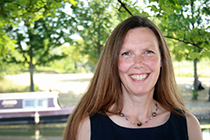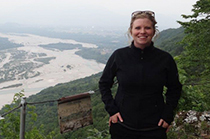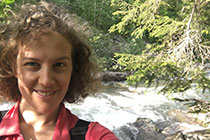Study options
- Starting in
- September 2025
- Location
- Mile End
- Fees
- Home: £12,250
Overseas: £28,500
EU/EEA/Swiss students
What you'll study
You will have the opportunity to network within the water and environmental sectors, meeting experts with experience of working in a wide variety of public- and private-sector organisations such as AECOM, Atkins Global, Defra, Environment Agency, Natural England and National Trust.
You will be able to develop transferable skills in field and lab methods, project management, statistical analysis, Geographical Information Systems (GIS), remote sensing, report writing, problem solving and presenting. We offer hands-on training in flood estimation and inundation modelling using industry-standard software, as well as river assessment methods.
You will be able to develop skills and knowledge in the monitoring and management of pollutants, nutrient levels and greenhouse gas emissions in aquatic systems and in the theory and practice of river restoration.
You will receive tailored research supervision and training suitable to your personal research interests to complete your individual research project. This will usually be completed in collaboration with a partner organisation.
Additional costs
- Your dissertation can include fieldwork conducted in the UK or overseas, and you would be responsible for the costs associated with this.
Structure
- Five compulsory modules
- Two elective modules
- Compulsory 12,000-word individual research project
For full module information, please see the QMUL Module Directory.
Compulsory/Core modules
Students are encouraged to undertake their Individual Research Project in collaboration with a practitioner / user organisation The theme for the Individual Research Project is selected by the student in collaboration with the module organiser and in most cases with the practitioner organisation in order to ensure that the project and practitioner link matches the research interests and career aspirations of the student. Students not wishing to link with a practitioner organisation can opt to undertake a free-standing research project of their choice, subject to approval by the module organiser. In either case, the project is undertaken over a twelve week period, and each student is allocated an academic advisor from the MSc academic staff to ensure that they receive appropriate academic guidance during the research. The project report will be marked by two members of the MSc academic staff (usually including the student's advisor) and, where the project is in collaboration with a practitioner / user organisation, comments on the project by the link person in that practitioner / user organisation will also be taken into account.
This module explores biogeochemical processes at the catchment level, with reference to the broader context of global climate and land use change. Major themes include interactions among the biogeochemical cycles; the linkages of biogeochemistry with sediment dynamics and hydrological processes; and climate change and land use effects on biogeochemical processes in floodplains, rivers and estuaries. The module introduces methods of field sample collection and laboratory analysis; and approaches to controlling pollutants, nutrient levels and greenhouse gas emissions in aquatic systems.
Students of Physical Geography and Environmental Science require a range of skills in data collection plus numerical, statistical and modelling skills to undertake higher-level analysis of environmental datasets. This module provides specific training and experience in approaches to the collection of field data and data from secondary sources as well as data analysis relevant to individual students or groups of students. This will include one-to-one or small group workshops on specific statistical methods, but the precise content of the teaching will be specific to the needs of the cohort in each year.
This module aims to provide the key knowledge and understanding at an advanced level necessary to support the development of management strategies for rivers along the catchment to coast continuum. Based upon an understanding of the multi-dimensional connectivity of fluvial systems, the module focuses on themes such as sediment and vegetation dynamics, river and floodplain process-form relationships, environmental flows, ecohydraulics and particular issues relating to constrained urban environments. Based on a solid scientific underpinning, the module introduces the legislative context, methods of field survey and assessment, and integrated approaches to the sustainable management of river systems, their flood plains and estuaries.
This module will connect students with the water sector practitioner/ stakeholder community and deepen understanding of science-based catchment management. The module will explore the ways in which advances in scientific understanding of catchment systems and developments in water policy have been translated into management, and the challenges associated with this. Students will engage with a diverse range of practitioners and stakeholder groups including government organisations, environmental consultancies, third sector/ charitable organisations and professional bodies to gain a broader perspective on catchment management and to develop a network of contacts. The module will also provide students with an opportunity to reflect on the knowledge and skills developed during the programme and how these can be communicated effectively to potential employers. The module is delivered through a combination of lectures and seminars led by Geography teaching staff, guest lectures and workshops by representatives from the water sector, field visits, student-led reading groups and attendance at external events.
Elective modules
This module offers the opportunity to develop advanced knowledge of an area of research through self-directed reading. In order to take this module, students must identify an area of interest that can be supervised by a member of the teaching team. The module is assessed by a 4000-5000 word paper that demonstrates advanced engagement with their chosen field of study. If supervision of the topic is agreed, students complete self-directed reading at an advanced level and discuss their readings and develop their paper at fortnightly supervision meetings. The structure of the report may vary according to the nature of the topic, and this is reflected in the word count range provided. Human Geography topics are expected to produce longer papers (up to 5000 words) while topics in Physical Geography and Environmental Science are likely to produce shorter papers (up to 4000 words) that may incorporate figures and data in certain circumstances.
The module is divided into two linked elements. The first explores the current status of flood risk and associated legislation in the UK and Europe. Flood generation mechanisms are examined and novel management options for reducing flood risk (including strategic rural land management and Sustainable Urban Drainage Systems) are critically reviewed. Flood protection in London is explored through a field trip to the Thames Barrier and potential impacts of predicted changes in climate and socio-economic conditions on UK flood risk are reviewed. The second component of the module is focussed on flood risk modelling. A combination of lecture and practical sessions are used to introduce students to design discharge estimation methods, flood frequency analysis and 1D inundation modelling using industry standard software.
The module introduces students to the sources, pathways and effects of a range of inorganic and organic pollutants in soils, sediments and aquatic environments. It will address current methods of pollution control, focusing on risk-based methods of pollution management and appropriate management strategies for different pollutant types. Developing a process-based understanding of contaminant cycles through the catchment-coast continuum, students will learn how to apply this to environmental management scenarios using case study material. The module includes a one-day site or field visit.
To what extent can climate change be mitigated by improved stewardship of terrestrial, aquatic and urban ecosystems? In this module, we examine how conservation, restoration and improved management of ecosystems can increase carbon storage and/or avoid greenhouse gas emissions. We evaluate a range of 'natural climate solutions' (NCS) for their feasibility, cost-effectiveness, environmental co-benefits and climate mitigation potential. You will take an active approach to learning through participation in lectures and interactive workshops. You will have the opportunity to undertake a non-residential field trip or to explore a virtual field experience. This module addresses the following United Nations Sustainable Development Goals (UN SDGs): SDG11 Sustainable Cities and Communities; SDG13 Climate Action; SDG14 Life below Water; SDG15 Life on Land; SDG17 Partnerships for the Goals.
Assessment
- 67% Modules
- 33% Research project
- All modules are assessed through a variety of coursework assignments including essays, literature reviews, scientific and design reports, presentations, modelling exercises, annotated bibliographies, skills portfolios and field notebooks
- You will complete a 12,000-word individual research project
Research project
Examples of past projects include:
- Use of beaver in Natural Flood Management (with Knepp Wildland)
- Effectiveness of wood in river restoration: the River Blackwater (with the Environment Agency)
- Classification of secondary channels in the River Nene (with Atkins Global)
- Causes of Phosphate losses in a chalk stream ( with Wessex Water)
- Detecting morphological and sedimentological adjustments within Woodsmill Stream, Sussex (with Atkins Global and the Sussex Wildlife Trust)

—The MSc Water and Environmental Management programme provided the perfect balance of academic depth and real-world application with engagement with professors and professionals from across the freshwater industry, preparing me more thoroughly than any graduate scheme could have. I’m excited to continue applying these skills in my role at Thames21 and to pursue a career where I am making a positive impact on the freshwater environment.
Lucy Hutchinson, MSc Water and Environmental Management
Teaching
Teaching comprises a mixture of formal lectures, field courses, laboratory and computer practicals, small group seminars and one-to-one supervision meetings.
If you choose to study part-time, the number of modules you take is reduced per semester. The full number of modules you need to complete the programme will be spread over two academic years.
In the 2024 Postgraduate Taught Experience Survey (PTES), 100% of our students agreed staff were good at explaining things and enthusiastic about what they were teaching. 93% of students agreed their research skills had developed during their course and 87% felt better prepared for a future career as a result of their course.
Find out more about the School of Geography’s inclusive approach to learning, co-created with our diverse student body, enhanced by our world-leading research.
Where you'll learn
Facilities
- Find out more about our Laboratories
- Geospatial analysis, remote sensing and environmental modelling software and computing facilities
- Analysis of environmental samples including water and sediment chemistry
- River Laboratory incorporating sediment transport demonstration channel, river simulator and digital camera equipment and software to capture river morphology in 3D
- Use dedicated Masters study and computing spaces within the School of Geography
- Access an unparalleled range of learning resources, special collections, and world-leading libraries within QMUL and the University of London.
Campus
Teaching is based at Queen Mary’s Mile End campus, one of the largest self-contained residential campuses in the capital. Our location in the heart of London’s East End offers a rich cultural environment.
Queen Mary have invested £105m in new facilities in recent years to offer our students an exceptional learning environment. Recent developments include the £39m Graduate Centre, providing 7,700 square metres of learning and teaching space.
The campus is 15 minutes by tube from central London, where you will have access to many of the University of London’s other facilities, such as Senate House.
About the School
School of Geography
Geography has been taught at Queen Mary since 1894, making us one of the longest-established schools of geography in the UK. Today, we are one of the leading centres for Geography, Environmental Science and Global Development scholarship in the world.
We were positioned 7th overall for the quality of our research in the latest UK nation-wide research rankings and 92% of our research was assessed as internationally excellent or world-leading (Research Excellence Framework 2021). The latest QS World University Rankings by Subject (2023) places us in the top 100 geography schools in the world.
Set in the heart of one of London’s most vibrant and diverse areas, the School is ideally placed for studying the capital’s people, places, cultures and environment, as well as being a global hub for geographical expertise. We have a culturally diverse and inclusive postgraduate community, with students drawn from 35 countries around the world in 2022.
We pride ourselves on our close research and teaching links with external partners including the Environment Agency, the Museum of the Home, the British Museum, Citizens UK and Natural England.
Career paths
The programme will provide you with knowledge and understanding relevant to employment in organisations in the water and environment sectors including government agencies, water companies, environmental consultancies and conservation organisations.
We what our recent students have done after their course to help you to maximise your potential and achieve your ambitions.
Our previous graduates have secured positions at a range of organisations including:
- Affinity Water
- Environment Agency
- ESIS Inc
- Jacobs
- JBA Consulting
- Parish Geomorphic
- South West Rivers Trust
- Thames Water
- Thames21
- Wood Group
- WSP
Explore integrate careers support into all of our degree programmes and how their time studying on this programme prepared them for life after graduation.
—The individual research project module was an invaluable experience. Personally, for my project, I had the pleasure of working with the National Trust and had the opportunity to use the School of Geography Laboratory’s state of the art equipment for soil and water analysis. The MSc provided me with the experience necessary to start a new position at the Environment Agency as a Fluvial Geomorphologist immediately after graduating. Overall, the expertise I gained through the course has been pivotal for my career in the water and environmental management industry.
Louise Ainslie, MSc Water and Environmental Management
Fees and funding
Full-time study
September 2025 | 1 year
- Home: £12,250
- Overseas: £28,500
EU/EEA/Swiss students
Unconditional deposit
Home: Not applicable
Overseas: £2000
Information about deposits
Part-time study
September 2025 | 2 years
- Home: £6,150
- Overseas: £14,250
EU/EEA/Swiss students
Unconditional deposit
Home: Not applicable
Overseas: £2000
Information about deposits
Queen Mary alumni can get a £1000, 10% or 20% discount on their fees depending on the programme of study. Find out more about the Alumni Loyalty Award
Funding
There are a number of ways you can fund your postgraduate degree.
- Scholarships and bursaries
- Postgraduate loans (UK students)
- Country-specific scholarships for international students
Our Advice and Counselling service offers specialist support on financial issues, which you can access as soon as you apply for a place at Queen Mary. Before you apply, you can access our funding guides and advice on managing your money:
Entry requirements
UK
Degree requirements
A 2:1 or above at undergraduate level in a relevant subject.
Find out more about how to apply for our postgraduate taught courses.
International
English language requirements
The English language requirements for our programmes are indicated by English bands, and therefore the specific test and score acceptable is based on the band assigned to the academic department within which your chosen course of study is administered. Note that for some academic departments there are programmes with non-standard English language requirements.
The English Language requirements for entry to postgraduate taught and research programmes in the School of Geography falls within the following English band:
Band 4: IELTS (Academic) minimum score 6.5 overall with 6.0 in each of Writing, Listening, Reading and Speaking
We accept a range of English tests and qualifications categorised in our English bands for you to demonstrate your level of English Language proficiency. See all accepted English tests that we deem equivalent to these IELTS scores.
Visas and immigration
Find out how to apply for a student visa.




